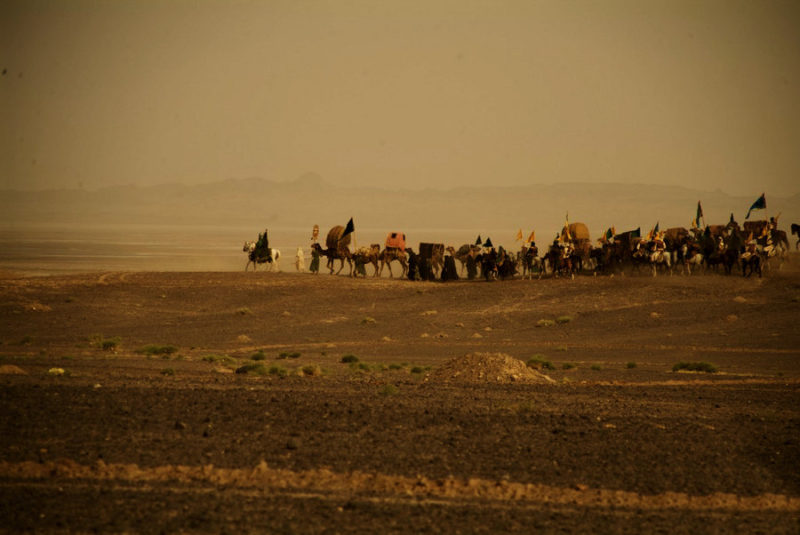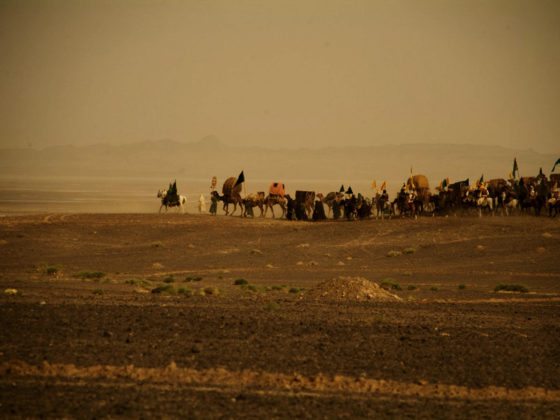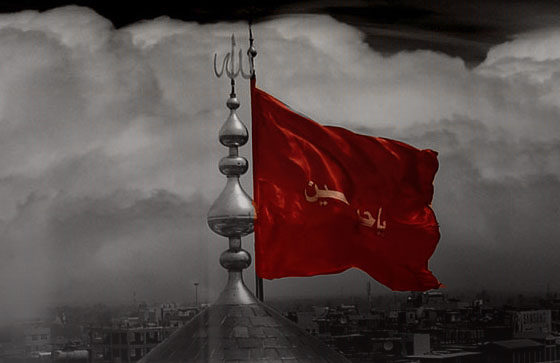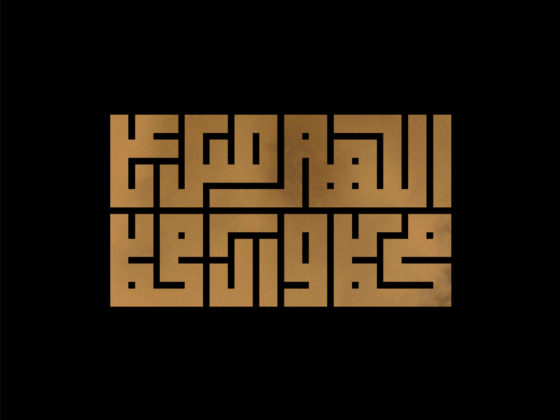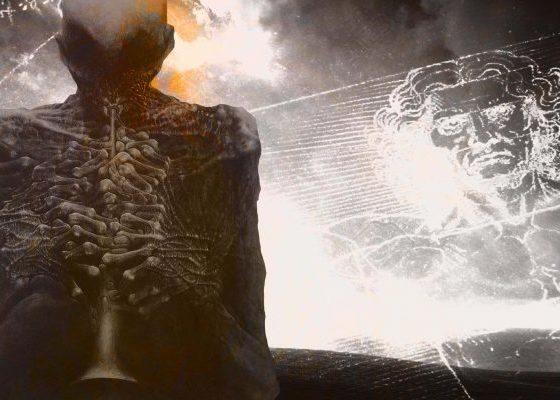The sources say that Imam Husayn (A) then continued moving on with his caravan until he reached a place called Zat-Irk. This place was established as a miqat for the people of Iraq for the Hajj, and it was forty-eight miles from Mecca on the road to Iraq.
Sayyid ibn Tawus reported in Luhuf: “Then he moved on until he reached a place called Zat-Irk and met Bishr ibn Ghalib there, who was traveling from Iraq, and asked him about news from there. He said: “Their hearts are with you and their swords are with the Umayyads.”
Sheikh Saduq narrates in “Amali” that Bishr ibn Ghalib also asked the Imam (A) about the meaning of the words of Allah in the Quran: “On the Day when We will call every people with their Imam” (17:71). He replied: “There is an Imam who calls to the straight path, and the people respond to him. And there is an Imam who calls to error, and the people respond to him. These are in Paradise and those are in Hell. And this is the word of Allah: “A part is in Paradise and a part is in Hell.” (42:7)
Ibn Asam (a Sunni historian) narrates this narration in “Futuh” as follows: “And he walked until he reached Dhat-Irk, where he met a man from the tribe of Banu Asad named Bishr ibn Ghalib. Husayn (A) asked him: “Who are you?” He replied: “A man from the tribe of Banu Asad.” He asked: “Where did you come from, O brother of Banu Asad?” He replied: “From Iraq.” He asked: “In what state did you leave the people of Iraq?” He replied: “O son of the daughter of the Messenger of Allah! I left them in such a state that their hearts are with you and their swords are with the Umayyads.” Husayn (A) said to him: “You have spoken the truth, O brother of the Arabs! Allah creates what He wills and decides as He wills.” Then Ibn Asam brings the same report on the interpretation of the verse of the Qur’an that we have cited above.
First of all, the question should be asked: who is Bishr ibn Ghalib? Bishr ibn Ghalib or Bishr Kufi is the transmitter from whom both Shia and Sunni sources cite hadiths. From what has come in the Shia sources, it follows that this person was well acquainted with Imam Husayn (A) before the events of Karbala, entered his house, and the Imam (A) initiated him into such secrets as the coming of the Mahdi of the family of Muhammad (S) and the events associated with it. For example, in “Ghayba” Numani it is narrated from Bishr that Imam Husayn (A) told him in a hadith, the beginning of which sounds like this: “O Bishr, how long will the Quraysh endure when Qaim al-Mahdi comes…”
Based on this, we should be careful with the part of Ibn Asam’s report about the meeting with Bishr where the Imam (A) asks about him and his origins. There had been a long-standing relationship of trust between him and Imam Hussein (A). Suffice it to say that it was this Bishr ibn Ghalib, along with his brother, who conveyed the du’a of Imam Hussein (A) on the day of Arafat.
Shia scholars such as Al-Barki, Sheikh Tusi, Ibn Shahr-Ashub and Sayyid Khui mention him among the companions of the Commander of the Faithful, Ali (A), Imam Hussein (A) and Imam Sajjad (A).
Among the reports about him in historical sources is that he visited Imam Sajjad (A) after the events of Karbala, was imprisoned by Mukhtar, and then was the chief of police in Kufa and maintained contacts with Hajjaj. Ibn Sa’d narrates in Tabaqat his regret for not supporting Imam Hussein (A): “Ali ibn Muhammad narrated to us from Sufyan, from Abdullah ibn Sharik, that he said: ‘I saw Bishr ibn Ghalib rolling on the grave of Hussein (A), regretting what he had missed by not supporting him.'”
As for the brief dialogue between Bishr and the Imam (A), we will comment here on several points:
Firstly, the situation of the people of Kufa was fully known to the Imam (A), and he did not go to them, relying on their letters and promises.
Secondly, when Bishr reported what was hidden in the hearts of the Kufa people, how could he have known about it? The hidden secrets of the hearts are known only to Allah Almighty and His vicegerent, the Imam, whereas the appeal swords against the grandson of the Prophet (S) is an obvious fact, visible to everyone. Therefore, we can only accept the second part of Bishr’s report, concerning the swords. Otherwise, how could the Imam (A) be killed some time later – killed unjustly, dishonestly, tyrannically and maliciously – and yet love him in their hearts? Obviously, Bishr’s report about the love of the Kufis for the Imam (A), which was supposedly hidden in their hearts, is a lie or a mistaken assumption. It is also possible that Bishr revealed what was hidden in himself, because he loved the Imam (A) in his soul, but did not support him, becoming one of the unfortunate … It often happens among people that they transfer their own thoughts or shortcomings to others. And as for the Kufis who later spoke out against the Imam (A), it is obvious from their actions that neither then nor later was there a drop of love for the Imam (A) in their hearts, and both their swords, and so do their hearts. And therefore the confirmation by the Imam (A) of Bishr’s words (“you have spoken the truth, O brother of the Arabs”), cited only by Ibn Asam, can be explained either by the fact that Ibn Asam himself attributed these words to him (just as he attributed to him his unfamiliarity with Bishr at the beginning of the dialogue), or by the fact that the Imam (A) confirmed their second part, concerning the swords, and Allah knows best.
Thirdly, Bishr’s question about the verse that contains a reference to the Imams of error and the Imams of the straight path… Every person has an Imam, a flag and a banner – and the choice is up to the person himself. As the Quran says: “We have guided him (man) either to the grateful path or to the disbelieving path” (76:3). The right path has an Imam from Allah, and error has an Imam from Satan, and on the Day of Resurrection, everyone will come under the banner of the Imam whom he followed in this world. Obviously, by asking this question and receiving an answer, Bishr completed his argument against himself. After all, he lived at a time when the two Imams were obvious with complete clarity. So has Bishr determined his position and the banner under which he will be gathered tomorrow, on the Day when people will appear before the Lord of the Worlds? Did he choose to be gathered with the Imam of the Straight Path on the Day of Resurrection and go to Paradise, or did he choose to be with the Imam of Misguidance and go to Hell?
He witnessed what Imam Hussein (A) went through on his way to Iraq with his family, children and a small number of companions. He saw a mournful caravan heading towards death. However, the sources do not say that the Imam (A) called him to support himself or to renounce his allegiance to Yazid. The Imam (A) did not give him examples of the Imams of Misguidance, nor did he even call Yazid as such (he never mentioned Yazid by name except for one occasion in Medina). He did not call him to fight against him, nor did he ask him to mobilize his people, acquaintances and community to support the Imam (peace be upon him) or against Yazid. From what we have just stated, it is clear to us that this Bishr ibn Ghalib knew Imam Hussain (peace be upon him) well, and Imam Hussain (A) knew him. He used to visit the Imam (A), accompany him, listen to him and transmit from him. He was one of the most famous transmitters of hadith. When he met the Imam (A), he described to him the situation of the Kufis, informing him that their swords were drawn against him, which meant that they would inevitably fight him as soon as they reached him. And yet, he did not stay with the Imam (A) or express his support for him! He passed by him on his way as if he had not noticed anything! It seems that he later realized the full evil of his situation and his betrayal of God, the Messenger (S) and the Imam (A), which made him roll on the grave of the Commander of Martyrs Husayn (A), in tears of shame and regret, but nothing could be done. However, after that we see him as the chief of police of Kufa, that is, in the service of the Umayyads, the enemies of the Imams (A) and their Shiites, as well as in the congregation of Hajjaj. Truly, man is amazing! We ask Allah for steadfastness on the path of truth and the honor of being written down in the book of Husayn (A) among those who would have supported him if they had been with him! As the hadith says: “O, if only we were with you, we would have succeeded with great success!”
There is another point that needs to be noted from the account of this meeting. Tabari, Ibn Kathir and Sheikh Mufid use the same phrase when speaking about the arrival of Imam Husayn (A) at Zat-Irk (we said that it was a place forty-eight miles from Mecca on the way to Iraq): “And Husayn (A) moved swiftly, not paying attention to anything, until he reached Zat-Irk” (Tarikh by Tabari, Vol. 5, p. 387; Bidayah wa Nihaya by Ibn Kathir, Vol. 8, p. 167; Irshad by Mufid, Vol. 2, p. 72). This means that the Commander of Martyrs (A) was moving quickly with his caravan, without looking back at anything, without caring about anything except covering the distance that separated him from Makkah to Dhat-Irq as quickly as possible. He had repeatedly mentioned the determination of the Umayyads to kill him in any case and that he did not wish to be killed in Makkah, within the Haram. This rapid movement on the road to Iraq clearly indicates that the people were eager to carry out his sudden murder or capture him in Makkah and its surroundings, and that they did not abandon him when he left his homeland with his family and children. They pursued him, exposing him to the danger that he wished to avoid. This does not indicate that he was in a hurry to reach Kufa. Rather, it indicates his haste to leave the precincts of the Sanctuary of Makkah lest he be killed there.
